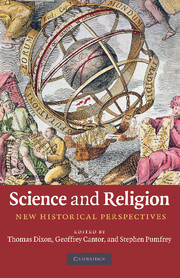Book contents
- Frontmatter
- Contents
- List of contributors
- Preface
- 1 Introduction
- PART I CATEGORIES
- PART II NARRATIVES
- PART III EVOLUTION AND CREATIONISM
- PART IV THE POLITICS OF PUBLISHING
- 9 A global history of science and religion
- 10 The Scopes trial beyond science and religion
- 11 Science, religion, and the history of the book
- PART V WAYS FORWARD
- Select bibliography
- Index
10 - The Scopes trial beyond science and religion
Published online by Cambridge University Press: 05 May 2010
- Frontmatter
- Contents
- List of contributors
- Preface
- 1 Introduction
- PART I CATEGORIES
- PART II NARRATIVES
- PART III EVOLUTION AND CREATIONISM
- PART IV THE POLITICS OF PUBLISHING
- 9 A global history of science and religion
- 10 The Scopes trial beyond science and religion
- 11 Science, religion, and the history of the book
- PART V WAYS FORWARD
- Select bibliography
- Index
Summary
In the waning days of the 1924–5 school year, John Thomas Scopes, a young teacher filling in for the regular biology teacher in Dayton, Tennessee, assigned reading from Hunter's Civic biology to prepare students for their final examination. This came after Tennessee had passed a law in March 1925 outlawing the teaching of evolution. Scopes was put on trial and convicted, and subsequently became a symbol of the (perceived) ongoing warfare between science and religion. Scopes was hailed by some as a martyr to intellectual freedom, compared to the likes of Socrates and Galileo. Often linked with the phrase ‘Monkey Trial’, the name ‘Scopes’ also became a label of derision by those who saw in evolution an irreligious and immoral doctrine. It has been immortalized in folk songs, on Broadway, and on the silver screen, and there is no doubt that the Scopes trial remains one of the best-known and most significant events in the history of science and religion in the United States. Because of two men – Clarence Darrow and William Jennings Bryan, whose debate over the truth of the Bible and its relationship to science captivated the country and was reported throughout the world – the Scopes trial has frequently been described as ‘the trial of the century’. Even as the twentieth century has given way to the twenty-first, interest in the trial has shown no sign of waning.
- Type
- Chapter
- Information
- Science and ReligionNew Historical Perspectives, pp. 198 - 220Publisher: Cambridge University PressPrint publication year: 2010
- 2
- Cited by

